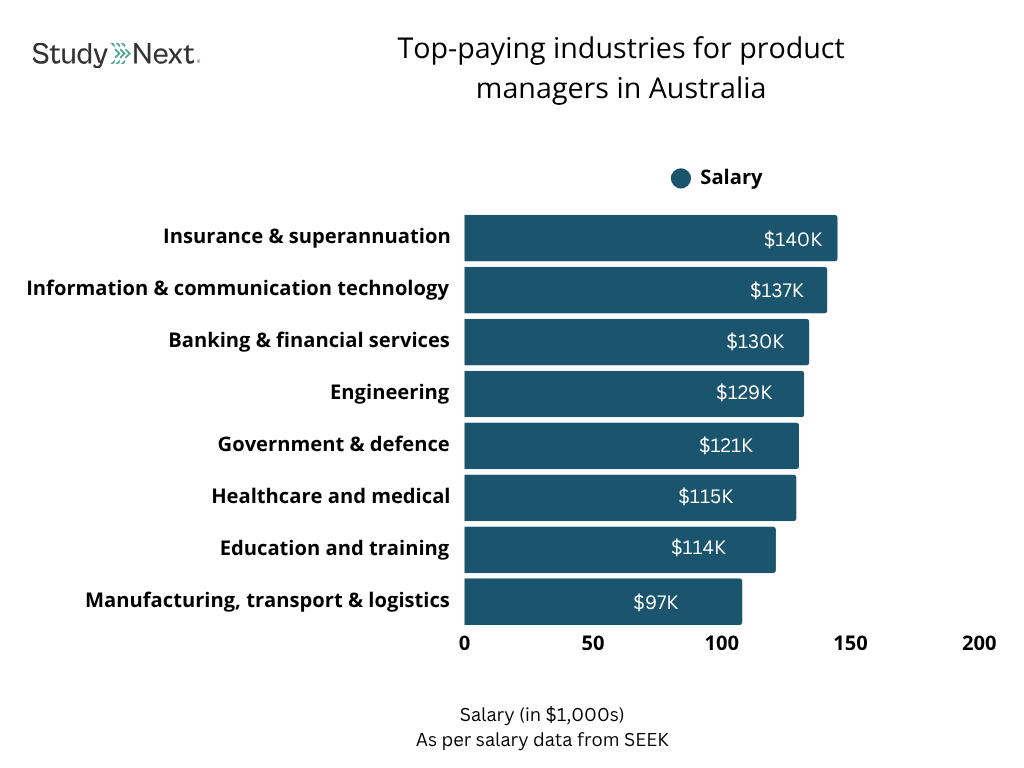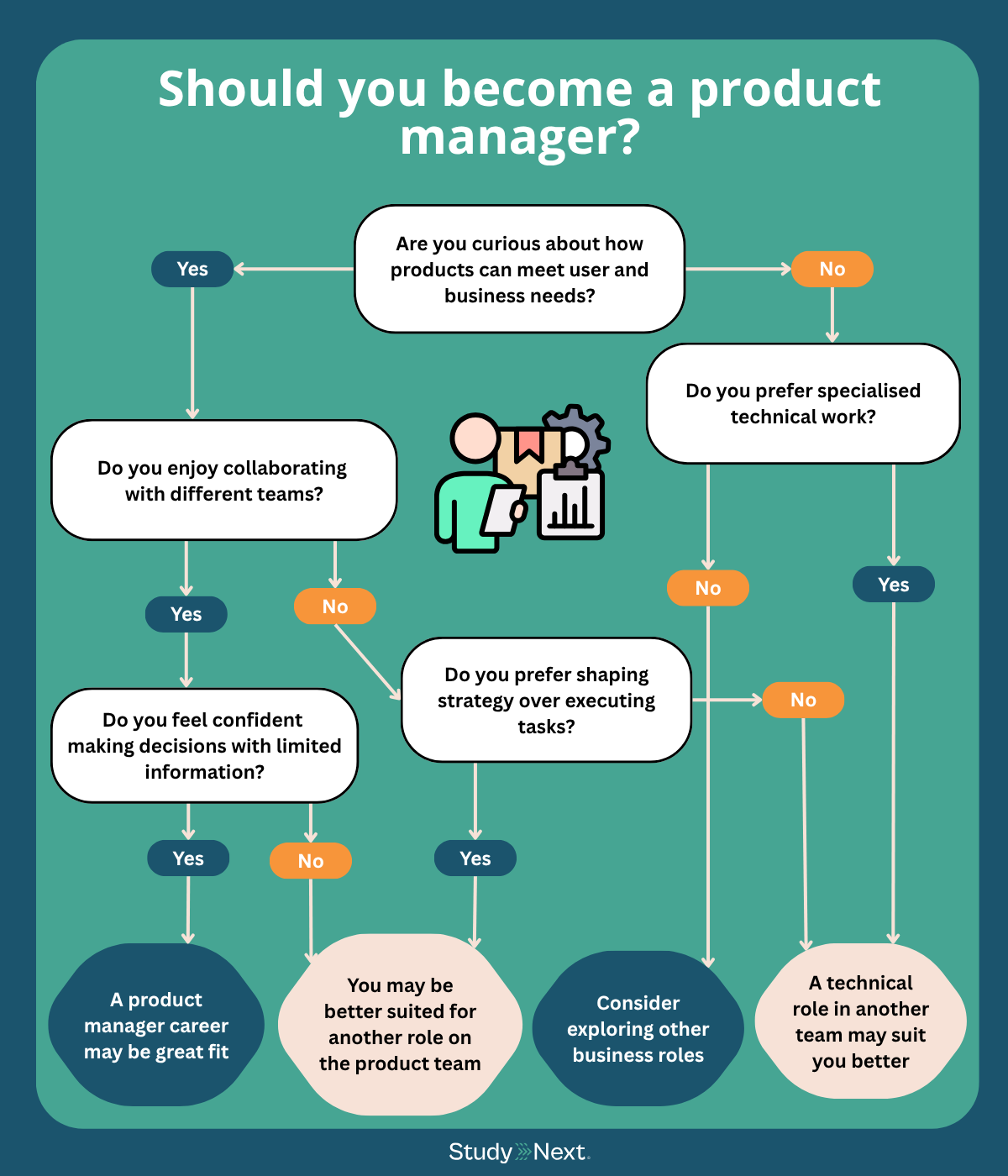In This Article
- What is a product manager?
- What does a product manager do?
- 6 steps to becoming a product manager in Australia
- What is a typical product manager salary in Australia?
- What skills does a product manager need?
- Who should become a product manager?
- Are product managers in demand in Australia?
- What’s the career growth for a product manager?
- Product manager vs product owner: what are the differences?
- Elevate your product management journey with a postgraduate degree

A product manager contributes to an organisation’s profitability by guiding the delivery of products that solve real customer problems while staying aligned with business objectives. If this sounds like a career path you'd like to explore, you may be wondering how to get started.
Read on to find out what your product management journey could look like, including insights into a product manager’s average salary, typical responsibilities and the skills you should develop to thrive. If you’re curious whether a career in product management suits you, you can take our quiz to help you see if it aligns with your strengths and interests.
What is a product manager?
Product managers play a vital role in developing products that meet customer needs. They are typically responsible for guiding teams from different departments and overseeing the product development process from ideation to launch. Product managers also regularly monitor how products perform in the market to assess their overall impact. Their work aims to ensure that products not only solve real customer problems but also align with business goals.
Since product managers work with employees across different departments, they may collaborate with scrum masters, designers, logistics managers and customer support executives. They may also work with various external stakeholders, including vendors, marketing agencies and clients, to gather insights, coordinate efforts and ensure smooth product delivery. Depending on their organisation’s structure, they may report to a product lead, head of product or even a C-suite executive such as a chief product officer.
The work environment of product managers can vary depending on their sector. For example, product managers in manufacturing may frequently visit production sites to ensure smooth operations. In contrast, many digital product managers typically work in office settings or remotely, as their work usually involves using online tools and engaging in virtual collaboration. This role may also require travelling, as product managers may participate in trade shows, visit facilities or engage in stakeholder meetings.
What does a product manager do?
While product managers are fundamentally focused on developing products according to market needs, their day-to-day tasks may vary depending on their role, organisation and industry. For example, technical product managers often work to translate technical requirements into user-friendly features. On the other hand, growth product managers focus on enhancing existing products to maintain their competitiveness in the market.
Despite these differences, many product manager roles share a set of core responsibilities, including:
- Creating product roadmaps and timelines to guide product delivery
- Discussing with business stakeholders to define product requirements
- Conducting market research to identify customer needs and trends
- Developing product ideas and prioritising features that can deliver the most value
- Delegating tasks and aligning work across teams
- Tracking progress throughout the product development lifecycle
- Ensuring products are developed on time and within budget
- Monitoring product performance and user experience to drive continuous improvement
- Providing product updates to company executives and key stakeholders
6 steps to becoming a product manager in Australia
The journey to becoming a product manager typically involves obtaining relevant qualifications and building practical experience. Since product managers can work across diverse industries, such as finance, technology and retail, their career paths can vary based on the sector-specific knowledge required. Below is an example of what your career journey may look like:
1. Complete an undergraduate degree
Pursuing an undergraduate qualification can help you gain the foundational knowledge you need to start building a career in product management. A bachelor’s degree in business, business administration, marketing or a related field can equip you with the skills and tools to develop products that consider customer needs and business objectives. Typically spanning three years of full-time study, the units you’ll take during your studies can help you build capabilities like strategic planning, market research and leadership, which are important for any product manager.
Alternatively, if you're aiming to work more closely with technical teams or enter the digital product space, a bachelor’s degree in information technology (IT) or computer science can be highly valuable. You can develop fundamental technical literacy, which can help you collaborate with developers and engineers effectively.
2. Gain work experience
Once you’ve obtained your undergraduate degree, you can start building practical experience by taking on an entry-level job. Entry-level roles like product coordinator or junior product analyst offer exposure to both product management and the broader industry, helping you assess whether pursuing this career path in that sector is right for you. As a part of the product team, you’ll typically support senior product members and the product manager by assisting with tasks like gathering data on product usage and customer feedback, preparing product reports and liaising with other departments to keep product initiatives aligned.
As you build experience, you can progress into a mid-level role with greater responsibility, such as a product specialist or product owner. At this stage, you may be involved in creating product roadmaps, collaborating with development teams and contributing to pricing and product profitability strategies. While building your technical skills, it’s also important to observe how your product manager coordinates cross-functional efforts. You can take the initiative to lead small projects and teams to help you refine the skills you need to take on a management role in this field.
3. Expand your professional network
As you progress in your career, you’ll encounter and engage with various professionals both within and beyond your organisation. If your role involves attending conferences and trade shows on behalf of your company, take the opportunity to connect with a diverse range of industry professionals. Networking not only expands your company’s reach, but it can also lead to opportunities that can advance your professional development and career growth. These connections may offer mentorship, industry insights and even open doors to future career opportunities.
4. Upskill with relevant certifications or short courses
If you’re looking to enhance your skill set in product management, you can consider gaining relevant certifications. Many employers value candidates with specific certifications, such as Agile, PRINCE2 or Project Management Professional, as evidence of your capability in managing projects in product management. These certifications can help demonstrate your expertise and may boost your competitiveness in the job market.
If you’re a working professional who wants to refine your product management skills, enrolling in a product management course can help you fulfil your objectives. Completing a short course can be a great, flexible alternative if you can’t commit to a full degree. RMIT University offers short courses for product management tailored to different learning goals. For example, the Product Management Fundamentals course is ideal for project managers, product owners, entrepreneurs or professionals seeking to upskill and integrate product management expertise into their current role or pivot into this field. This online course delves into essential topics like product market fit, go-to-market strategy, product roadmaps and product delivery.
As businesses are increasingly adopting artificial intelligence (AI) in their operations, you may be interested in the intersection of AI and product development. The AI Product Manager short course is designed for aspiring product managers looking to specialise in managing AI-driven products. Spanning over four weeks, this course explores fundamental AI concepts, AI in product management and the effectiveness of this emerging technology. You’ll gain hands-on experience working with multimodal datasets, such as text, video and audio, and learn how to design and refine AI models for personalisation, forecasting and generative AI.


Product managers play a critical role in business as the leaders of the vision, strategy, design, execution and optimisation of new and established digital products. The product management skills benchmark report states that one in five products fail to meet customer expectations, making a well-performing product manager, a great product vision and a solid launch even more critical. As a product manager, you’ll possess a diverse skillset and wear multiple hats, including data analysis, product optimisation, stakeholder management, product lifecycle management and more.
Whether you're looking to upskill or transition into the role of a product manager, this course will provide you with the end-to-end skills to deliver and optimise successful digital products. You'll explore product market fit, a go-to-market strategy, product roadmaps, product delivery and more.


As the landscape of AI continues to evolve rapidly, this AI Product Manager course will equip you with the skills needed to define the success of machine learning products. From gaining insights into AI basics and business value derivation, this program will empower you to make informed decisions regarding AI utilisation.
This program covers foundational AI concepts, focusing on applying AI in product management, creating business cases and evaluating AI effectiveness. You’ll gain skills in leveraging data, including bespoke multimodal datasets (text, video and audio) and explore building and refining AI models such as personalisation, forecasting and GenAI. Additionally, you’ll learn to assess model performance using key metrics like accuracy, fairness and bias while developing practical AI-powered product proposals and roadmaps.
This AI Product Manager course will be delivered to you in partnership with Udacity, meaning you’ll have access to both Udacity’s learning and career services as well as RMIT Online’s course enablement support through the Learner Success team.
5. Consider postgraduate study
While a postgraduate degree isn’t a requirement for many product manager roles, pursuing this qualification can be a great strategic move to accelerate your career growth. Further study can help you gain advanced expertise in your current discipline or explore a new field that can complement your existing product management skills. For example, a master’s degree in data analytics can help you develop your skills to make more informed and data-driven decisions in product management.
If your goal is to boost your business acumen and leadership skills, you can consider studying a Master of Business Administration (MBA). As MBA courses usually delve into core business areas like finance, marketing and operations, they can enhance your ability to make strategic product decisions that align with broader company objectives. As product managers often lead cross-functional teams, strong leadership and communication skills are important. MBAs help you refine these skills through group projects, case studies and simulations of real-world business challenges. An MBA can support your professional development and may help position you for more senior product roles.
Many MBAs include learning experiences that align well with product management. For example, the University of Melbourne’s Master of Business Administration features the Innovation Bootcamp, which involves five days of lectures on innovation, disruption, business model testing and idea pitching. This unit also includes workshops on creative brainstorming and design thinking, with insights from established guest speakers and professors. Completing this bootcamp is particularly valuable for aspiring product managers, as people in this role are often tasked with generating innovative solutions that balance customer needs and business goals.
If you’re aiming to specialise in digital product management, you can consider Monash University’s Master of Business Administration (Digital). This course offers a unit called Innovation and Change for Digital Transformation, which focuses on the modern application of innovation frameworks like the business model canvas and customer experience mapping. Through collaborative virtual team projects, you'll learn how to put design thinking and agile methodologies into practice. This unit is designed to help you develop the mindset and skills needed to lead innovation and deliver successful digital products.


Designed with a focus on practical skills for any business application, the full-time Master of Business Administration (MBA) offers a breadth of knowledge, tools and opportunities to apply what you learn in a real-world setting.
You can choose to study over two years, embracing the full MBA experience or accelerate your pace to move through your subjects quicker, allowing more time for internships, exchange opportunities and career development.
Flexible Length
The program pace can be tailored to match your needs. Study for over two years, embracing the full MBA experience or accelerating your pace to move through your subjects quicker, allowing more time for internships, exchange opportunities, and career development.


The Master of Business Administration (Digital) provides the knowledge and skills you need now, as well as the strategies and methods you need to stay informed, relevant, and current as an uncertain future unfolds. In this degree, you will be equipped to:
- Lead the adoption of new technologies and perspectives across business operations.
- Make innovative and informed strategic choices in light of changes in business's economic, political, and environmental context.
- Maintain currency with ongoing changes in business practice for the balance of your career.
The course comprises 12 units: Six Operational Knowledge units covering contemporary practice across the primary functions of any organisation; three Organisational Skills units including Strategic Management, Leadership, and Innovation; and three Professional Skills units including methods for Currency and Lifelong Learning, Career Advancement, and Professional Community Development.
You can begin your Master of Business Administration (Digital) within weeks of making your application. Online delivery lets you fit study around your busy work and family commitments. With flexible delivery, you can set your pace to meet changing circumstances.
As a Master of Business Administration (Digital) graduate, you’ll have the knowledge and skills necessary to advance your career and take your place as a strategic manager and leader no matter what comes next.
6. Apply for a product manager role
Depending on how long you’ve worked in product management, you may be well-positioned to apply for a product manager role. According to job vacancies on SEEK, junior product manager jobs typically require a minimum of two years of relevant experience, while senior roles may ask for five to 10 years. When developing your resume, be sure to highlight your past involvement across the product lifecycle, any relevant technical skills and your ability to lead diverse teams. These experiences are essential in demonstrating how you can contribute effectively as a product manager.
What is a typical product manager salary in Australia?
SEEK reports that the average product manager salary in Australia ranges between $120,000 and $140,000 per year. Discover the typical salary for this position in each state and territory below:

A product manager’s salary may also vary depending on which industry they work in, such as:

What skills does a product manager need?
To thrive as a product manager, you’ll need a balanced combination of hard and soft skills, which include commercial acumen, project management, technical expertise, communication, strategic thinking and leadership. These skills can help you navigate product management challenges and deliver impactful products. Explore key product manager skills below to understand why developing them is essential.
Hard skills
Commercial acumen: Commercial insight is essential for a product manager as you need to know your company’s target audience, sales statistics, market demographics and what unique value your products offer. This knowledge can enable you to design and develop products that address customer needs and contribute to business profitability.
Project management: Product management frequently involves coordinating cross-functional teams to ensure smooth execution. Strong project management skills can help keep diverse team members aligned to business goals and ensure that timelines and budgets are met throughout the development process.
Technical expertise: You can support key aspects of product management by having expertise in using tools like JIRA for project tracking, Azure for cloud infrastructure and Tableau for data visualisation. As companies continue to adopt digital-focused strategies, product managers who are familiar with these technologies may be better equipped to drive innovation.
Soft skills
Communication: Since product managers regularly engage with colleagues across departments and external stakeholders, strong communication skills are essential for building positive relationships and fostering collaboration. You may also be expected to deliver presentations or product demos, so you need to be able to convey ideas in an engaging way and tailor your message to suit technical or non-technical audiences.
Strategic thinking: This skill is essential as you need to align your decisions with broader organisational objectives while responding to market shifts. Not only do you need to determine which product to build, but you also need to ensure that the product remains competitive and relevant after its launch.
Leadership: As a product manager, you could be guiding employees from various departments, including researchers, designers, developers and marketers, to ensure seamless product development and launches. Strong leadership can help you maintain momentum, motivate team members and ensure everyone has the resources needed to work towards shared product goals.
Who should become a product manager?
Becoming a product manager could be a rewarding career path if you enjoy combining strategic thinking with cross-functional collaboration. In this role, you're often responsible for identifying market problems and figuring out how to solve them, even when there’s minimal direction. This role may be ideal if you thrive on pinpointing and addressing customer challenges, analysing market data and making decisions that shape the development of a product.
Product managers often act as the bridge between various departments, including design, marketing and customer support, to ensure everyone is aligned with shared product goals. If you’re passionate about working with diverse colleagues and stakeholders to deliver impactful products, a career in product management could be highly fulfilling.
If you’re not sure whether becoming a product manager suits your strengths and interests, take the quiz below to help you find out.

Are product managers in demand in Australia?
Product managers are currently in demand in Australia, with SEEK projecting a job growth of 22.3 per cent over the next five years. This demand is also reflected in the platform’s job listings, where sectors like sales, information and communication technology, as well as marketing and communications, report over 1,000 vacancies for product manager jobs. For recent graduates and working professionals, this growing employment trend presents promising opportunities for them to enter or move into this field and build a rewarding career.
What’s the career growth for a product manager?
A career as a product manager can open doors to exciting growth opportunities, including advancement into senior roles like product lead, head of product and chief product officer (CPO). While these jobs focus on delivering profitable products, they differ based on their authority and scope of responsibilities. Explore the responsibilities of each role below, along with typical salary ranges where available on SEEK.
Product lead
Product leads are typically responsible for the execution and management of a product domain within an organisation. While product managers typically focus on individual products, product leads oversee several product streams or a broader product area, ensuring alignment with business goals. In larger organisations, this professional may manage and guide a group of product managers. They often play a vital role in maintaining a customer-driven product roadmap, encouraging regular feedback cycles to evaluate product performance and driving continuous improvement.
Average salary: $140,000 to $160,000
Head of product
The head of product oversees the strategic direction of an organisation’s entire product portfolio. They manage multiple product areas, translating customer insights, market trends and performance data into a cohesive long-term strategy that aligns with business objectives. These strategies may also be based on key performance indicators like margin growth, pricing accuracy and overall product performance. They often work closely with other heads from different business functions to ensure that major product initiatives align with broader organisational goals and priorities.
Average salary: $200,000 to $220,000
CPO
A CPO holds the highest-ranking product role within an organisation, overseeing the entire product division. They lead all product team members and steer a company’s product direction at the executive level, which may cover areas like product vision, design, development and marketing. In some sectors, their scope may also include product manufacturing and distribution. Their role may involve establishing and monitoring company-wide key performance indicators (KPIs) to assess product impact. These metrics can also be used to guide strategic decisions and support continuous optimisation across the product portfolio.
Average salary: N/A
Product manager vs product owner: what are the differences?
While a product manager focuses on the strategic direction and business objectives of a product, a product owner has a more hands-on role with building it. Although some of their responsibilities may overlap, their focus and scope differ significantly. Discover their key differences below:
| Category | Product manager | Product owner |
|---|---|---|
| Primary focus | Analyses the market and delivers products aligned with customer needs and business goals. | Focuses on the product development process, from ideation to quality assurance. |
| Product involvement | Creates a strategic product vision and roadmap to guide development and launch. | Works directly with development teams to ensure the product aligns with the specifications set by the product manager. |
| Stakeholder management | Often engages with both internal and external stakeholders, including cross-functional teams, clients and vendors. | Typically communicates with stakeholders within an organisation, such as management, board members and internal teams. |
| Key skills | Typically skilled in conducting market research, strategic thinking and project management. | Usually has capabilities in technical areas like programming, coding and user experience design. |
| Education | May have a degree in business, business administration or marketing. | May have a degree in engineering, IT or computer science. |
Elevate your product management journey with a postgraduate degree
Product managers play a key role in helping companies deliver meaningful value to their customers. If you’re aiming to advance your career or enter this field, pursuing postgraduate study can help you obtain the necessary skills to align customer needs with business objectives. Explore diverse postgraduate business courses offered by top universities in Australia that can help accelerate your journey in product management.























